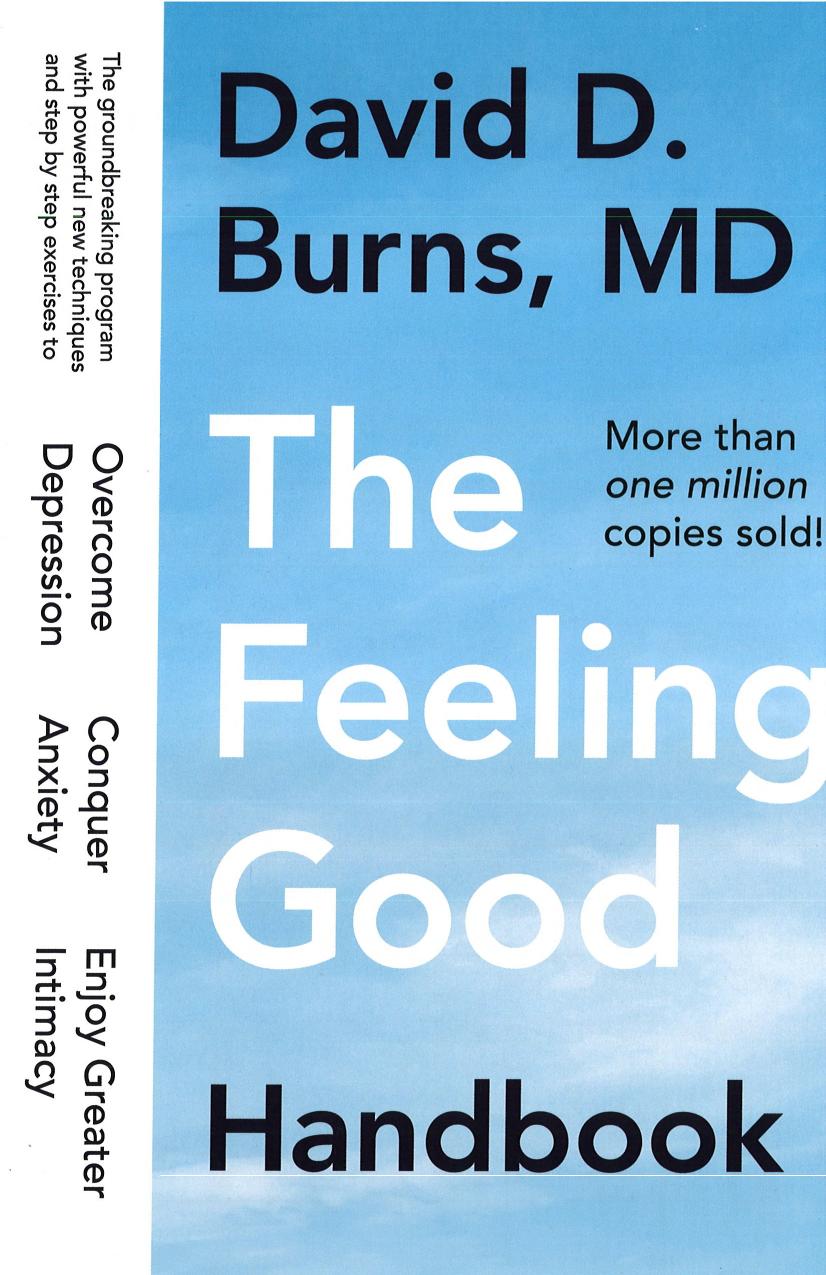The Feeling Good Handbook by David D. Burns

Author:David D. Burns [Burns]
Language: eng
Format: epub, pdf
Tags: Health & Fitness, Psychology, Cognitive Psychology, Medical, Alternative Therapies, General, Psychotropic drugs, Self-Help, Psychiatry, Personal Growth, Psychopharmacology, Psychotherapy, Cognitive therapy, Self-Esteem
ISBN: 9780452281325
Publisher: Plume
Published: 1999-10-15T04:00:00+00:00
David D. Burns, M.D.
SHIBA: It was just like your father to pull something like this. His head isn't screwed on straight.
DAVID: He never was too good at budgeting. You've always been much better at that.
SHIBA: He's a louse! Here we are on the verge of poverty.
What if I get sick? We'll end up in the poorhouse!
DAVID: You're right! It's no fun at all to live in the poorhouse. I agree with you completely.
Shiba reported that in her role as Mother she found it was
"no fun" to complain because I kept agreeing with her. We did a role-reversal so she could master the technique.
In fact, it is your urge to help complainers that maintains the monotonous interaction. Paradoxically, when you agree with their pessimistic whining, they quickly run out of steam.
Perhaps an explanation will make this seem less puzzling.
When people whine and complain, they are usually feeling irritated, overwhelmed, and insecure. When you try to help them, this sounds to them like criticism because it implies they aren't handling things properly. In contrast, when you agree with them and add a compliment, they feel endorsed, and they then usually relax and quiet down.
5. Moorey Moaner Method. A useful modification of this technique was proposed by Stirling Moorey, a brilliant British medical student who studied with our group in Philadelphia and sat in with me during therapy sessions during the summer of 1979. He worked with a chronically severely depressed fifty-two-year-old sculptor named Harriet with a heart of gold. Harriet's problem was her friends would often bend her ear with gossip and personal problems. She found these problems upsetting because of her excessive capacity for empathy.
Because she wouldn't know how to help her friends, she felt trapped and resentful until she learned the "Moorey Moaner Method." Stirling simply instructed her to find a way to agree with what the person was saying, and then to distract the moaner by finding something positive in the complaint and to comment on it. Here are several examples:
1. MOANER: Oh, what in the world can I ever do about my daughter? I'm afraid she's been smoking pot again.
RESPONSE: There sure is a lot of pot going around 200
Download
This site does not store any files on its server. We only index and link to content provided by other sites. Please contact the content providers to delete copyright contents if any and email us, we'll remove relevant links or contents immediately.
| Administration & Medicine Economics | Allied Health Professions |
| Basic Sciences | Dentistry |
| History | Medical Informatics |
| Medicine | Nursing |
| Pharmacology | Psychology |
| Research | Veterinary Medicine |
The Art of Thinking Clearly by Rolf Dobelli(10489)
The 5 Love Languages: The Secret to Love That Lasts by Gary Chapman(9815)
Mindhunter: Inside the FBI's Elite Serial Crime Unit by John E. Douglas & Mark Olshaker(9343)
Becoming Supernatural by Dr. Joe Dispenza(8217)
Nudge - Improving Decisions about Health, Wealth, and Happiness by Thaler Sunstein(7707)
The Road Less Traveled by M. Scott Peck(7603)
Mastermind: How to Think Like Sherlock Holmes by Maria Konnikova(7347)
Enlightenment Now: The Case for Reason, Science, Humanism, and Progress by Steven Pinker(7313)
Win Bigly by Scott Adams(7198)
The Way of Zen by Alan W. Watts(6614)
Factfulness: Ten Reasons We're Wrong About the World – and Why Things Are Better Than You Think by Hans Rosling(4742)
The State of Affairs by Esther Perel(4721)
Gerald's Game by Stephen King(4654)
Man's Search for Meaning by Viktor Frankl(4606)
The Confidence Code by Katty Kay(4260)
Thinking in Bets by Annie Duke(4227)
The Healing Self by Deepak Chopra(3579)
Hidden Persuasion: 33 psychological influence techniques in advertising by Marc Andrews & Matthijs van Leeuwen & Rick van Baaren(3565)
The Worm at the Core by Sheldon Solomon(3487)
